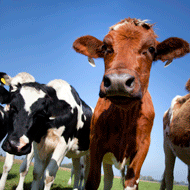BVA welcomes TB genetic index

The index is expected to play a part in the plan to eradicate bTB from UK farming.
The BVA have welcomed a new genetic index which is set to help in the fight against bovine TB.
The TB Advantage index, to be published next Tuesday (19 January), will give an indication of an animal's genetic susceptibility to bTB by highlighting those which may be more prone to infection, or those which have a higher degree of resistance to the disease.
By selecting bulls with a high TB advantage score, farmers will be able to breed better resistance into their herd, which will accumulate over the generations leading to long-term benefits.
Used alongside existing bTB control measures, the index is expected to play a part in the plan to eradicate bTB from UK farming.
Welcoming the move, BVA President Sean Wensley said: “This pioneering index is another valuable asset that can be used in the fight against bovine TB, as part of a comprehensive strategy to control and eradicate the disease in the UK.
"As with the use of any genetic index, farmers and vets need to evaluate the benefits of selecting for different traits within a breeding programme against the compromises it might bring in other areas of animal health, as part of an overall breeding strategy.”
The index is the first in the world to be developed to help farmers breed better resistance to bTB into their herds.
It will be expressed on a scale which typically runs from -3 to +3, similar to many genetic indexes farmers are familiar with using. The average TB Advantage for all bulls with an index is zero.
Almost all Holstein bulls will have an index, and those female Holsteins which have had their genotype measured will also be scored for TB Advantage.
The initial index run for Holstein bulls will be published at the British Cattle Conference on 19 January. Following this, the TB Advantage will be published by AHDB Dairy as part of the routine genetic evaluations three times a year.



 HMRC has invited feedback to its communications regarding the employment status of locum vets and vet nurses.
HMRC has invited feedback to its communications regarding the employment status of locum vets and vet nurses.